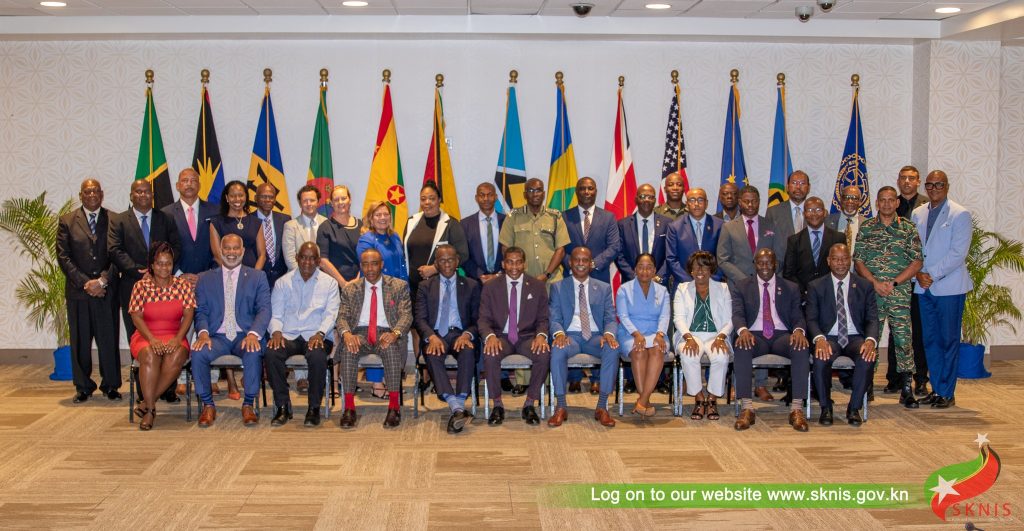RSS Council of Ministers Convenes in Saint Kitts
The 2025 Regional Security System (RSS) Council of Ministers Meeting, hosted by the Federation of Saint Kitts and Nevis on April 6, 2025, served as a crucial platform for regional security discourse and collaboration. The meeting, which commenced with an opening ceremony on April 4th at the St. Kitts Marriott Resort, facilitated a comprehensive review of the RSS’s operational activities over the past year, including a presentation of its budget. Crucially, the gathering provided an opportunity for member states to engage in high-level discussions on critical security challenges facing the region and to strategize on collaborative approaches to enhance safety and stability. The central themes of the meeting revolved around crime reduction strategies, international cooperation mechanisms, and citizen security initiatives, all underscored by the recognition of shared responsibility and the imperative for a multi-faceted approach to regional security.
The meeting emphasized the interconnectedness of security challenges and the necessity for a holistic approach to address them. Discussions underscored the importance of integrating local, regional, and international security efforts to effectively combat crime and promote stability. This interconnected approach acknowledges that security threats transcend national borders and require collaborative efforts across multiple jurisdictions. The emphasis on international cooperation highlighted the need for shared intelligence, joint operations, and capacity-building initiatives among member states and international partners. Such collaboration is essential for tackling transnational criminal networks, addressing cross-border security threats, and strengthening regional security architectures.
Citizen security emerged as a prominent theme during the meeting, reflecting a growing recognition of the importance of community-based crime prevention and the need to address the root causes of crime. The discussions centered on strategies to enhance citizen safety, promote community policing, and foster trust between law enforcement agencies and the communities they serve. The focus on citizen security acknowledges that sustainable safety and stability require more than just robust law enforcement; they demand community engagement, social programs, and initiatives that address the underlying socioeconomic factors that contribute to crime. This approach emphasizes proactive measures to prevent crime, rather than solely reacting to it, and fosters a sense of shared responsibility for security between citizens and law enforcement.
The meeting also advocated for a public health approach to crime prevention, a paradigm shift that views crime not just as a legal issue, but as a social issue with deep-seated causes that require comprehensive interventions. This approach emphasizes understanding the underlying factors that contribute to criminal behavior, such as poverty, inequality, lack of education, and mental health issues. By addressing these root causes through social programs, educational initiatives, and community development projects, the public health approach aims to prevent crime before it occurs, rather than simply reacting to its consequences. It emphasizes early intervention, rehabilitation, and restorative justice as key elements of a comprehensive crime prevention strategy.
Outgoing RSS Chair, Prime Minister Hon. Dr. Terrance Drew of Saint Kitts and Nevis, delivered impactful remarks that resonated throughout the meeting. He underscored the critical need for connecting local, regional, and international security efforts to effectively combat crime and ensure regional stability. This call for integrated security strategies reflects the understanding that national security is inextricably linked to regional and international security dynamics. Prime Minister Drew’s remarks emphasized the importance of collaboration and information sharing between national law enforcement agencies, regional security organizations, and international partners.
Prime Minister Drew further emphasized the importance of adopting both short-term and long-term perspectives in addressing security challenges. He stressed the need for immediate actions to counter pressing threats while simultaneously investing in long-term solutions that address the root causes of instability. This dual approach recognizes the need for immediate responses to crises while acknowledging that sustainable security requires addressing underlying social, economic, and political factors. By focusing on both short-term and long-term strategies, the region can effectively manage immediate security risks while simultaneously building a more resilient and secure future. The 2025 RSS Council of Ministers Meeting, therefore, served as a vital forum for advancing regional security cooperation and solidifying the commitment to collaborative approaches in tackling the complex security landscape facing the Caribbean.
Share this content:












Post Comment